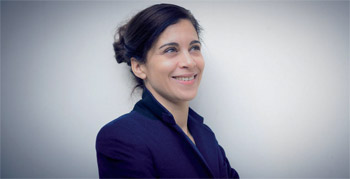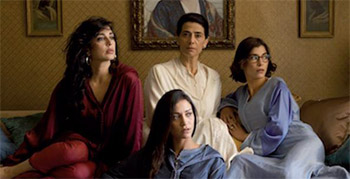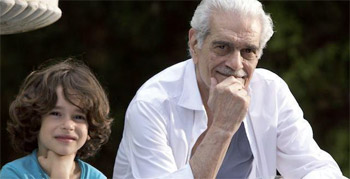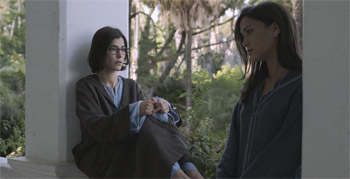Laila Marrakchi Rock The Casbah Interview

Laila Marrakchi Rock The Casbah Interview
Cast: Nardine Labaki, Morjana Alaoui, Lubna Azabai, Hiam Abbass, Omar Sharif
Director: Laila Marrakchi
Rated: M
Running Time: 98 Minutes
Synopsis: Summer in Tangiers, Morocco. A family reunite for three days in their home following the death of their patriarch, the influential businessman Moulay Hassan (film legend Omar Sharif), to share their memories and to grieve for his loss according to Muslim tradition. They have left the beach behind and swapped swimsuits for djellabas as everyone gathers in a show of mourning.
However, sparks start to fly when prodigal daughter Sofia jets in from New York after several years away. The youngest, she has made a new life for herself as an actress in America, but frustratingly, only ever gets television roles as a terrorist. Her return provides the opportunity to settle some scores with her sisters, as the order once maintained by Moulay breaks down.
Between laughter and tears, a collective hysteria leads each of the women to confront some home truths that have boiled beneath the surface for years.
Rock The Casbah
Release Date: November 20th, 2014
Interview with Laila Marrakchi
Question: Where did the idea for the film first come from?
Laila Marrakchi: A few years ago, my elderly uncle died. It was shortly after the release of MAROCK, my first feature film. He was a very important figure in my family – a sort of whimsical patriarch, full of poetry. I went through three very moving days of mourning, during which I discovered the women in my family in another light. I saw them as fragile, but unafraid of revealing themselves. I thought this could be the subject for a film through which I could show our traditions, which are very different from those of the western world. But I was afraid it would be too gloomy to make a film about a funeral, especially since the subject has been covered often in cinema.
Question: At the time, you were busy with another project.
Laila Marrakchi: I was working on a script about the Oufkir family. After two-and-a-half years, the project came to a halt when we were in the preparation phase. As a result, I came back to the idea which turned into Rock The Casbah. In the meantime, lots of stuff had happened in my personal life. I put some of these elements into the script: the end of adolescence, the difficulties of passing into adulthood, maternity, and the search for identity.© Dav
id Souenellen Question: Rock The Casbah is centered around the death of the head of the family. Can one see in this death a metaphor for the situation in the Arab world today?
Laila Marrakchi: Absolutely. This death symbolizes the end of an era. Once the head of the family has disappeared, you can feel the stirrings of revolt. His death has a revelatory effect on the women. For the three days of mourning, they can finally express themselves freely – even let themselves fly off the handle, in some cases. As a result of being constantly restrained, forced to put up and shut up, oriental women inevitably tip into excess.
Question: MAROCK probed the opposition between young and old, modernity and tradition, and the desire for freedom and conservatism. These themes reappear in ROCK THE CASBAH, but this time, they involve adult characters.
Laila Marrakchi: MAROCK dealt with youth which defined itself in opposition to parents, society and tradition. Revolt and the quest for freedom were shown as being essential. It was all about the insolence of youth. In Rock The Casbah, I was interested in observing the passage into adulthood for these women who remained infantile. They have lost their illusions. They are no longer struggling and live in nostalgia. They aren't fulfilled because society has imposed things on them, and at the same time they haven't fought for fulfillment: to love the person they wanted to, or lead the career they might have hoped for. Instead, they have allowed themselves to be closed in by their environment, and this in a culture in which it's very complicated to affirm one's individuality and to find a middle path.
Question: The film tackles these themes with humor and affection.
Laila Marrakchi: It seemed that was the best way to observe this family, who appear to be wrapped in a cocoon. An ideal place, but one where there's a real violence in the relationships.
Question: The four women in the film remind us of the song 'Four Women" by Nina Simone: the first, docile and gentle; the second brazen; the third defeated yet dignified; the last determined to change things.
Question: Among them, the character played by Nadine Labaki (Miriam) is the most surprising: a dumb bimbo to begin with, we find out later that she's deeply moving.
Laila Marrakchi: Miriam is constantly exuberant and excessive, even in terms of her appearance. She embodies those very sophisticated Moroccan women who think that emancipation is first and foremost about how they look, rather than an inner quest. What I find moving about them is their profound solitude. They appear to have all the trappings of the liberated woman, but they don't really live out their status as women. They may well have had an education and seem emancipated, it is still tough to be a fully-fledged woman in that society. Especially since we don't have any role-models upon which to build. Often, all we find are mothers or successful career women, who let their personal fulfillment come in second place.
 Question: Sofia is the only who dared to free herself from paternal authority by going to live in the United States.
Question: Sofia is the only who dared to free herself from paternal authority by going to live in the United States. Laila Marrakchi: Sofia found the only way to exist was to leave. She emigrated to the United States, which in those countries represents the ultimate dream – or else the devil incarnate. But life is not so straightforward: she got married and became an actress, but her marriage is foundering. Sofia is almost in denial about her family and her country. Like the others, she is overwhelmed by the death of her father, with whom she had broken off. This return to her roots is key for her internal reconstruction.
Question: She also couldn't deal with the suicide of her older sister. What's more, she accuses others in her family of being responsible for this tragedy.
Laila Marrakchi: She carries the burden of living up to what her sister never managed to fulfill – escaping the father and becoming an actress. On top of that, Sofia feels responsible for the situation of the mother and sisters, who themselves are not fulfilled. She is no doubt the most structured of the women in this family. She is also the most 'westernized".
Question: During the three days of mourning, when drinking and smoking is strictly forbidden, you show that no one holds back in terms of transgressing these rules – not even the ghost of the father, who sips a whisky.
Laila Marrakchi: In this very regulated society, transgression is their only form of expression. It's as if they were are all permanently trapped in a pressure cooker: they say the opposite of what they think, do the opposite of what they say, and go out to bars to smoke and drink in secret. It's a society that is permanently torn by contradictions. This sometimes gives rise to some very funny situations, and also makes these characters very touching.
Question: What is the main problem with this society, in your view?
Laila Marrakchi: Sexuality. The frustration people feel is enormous. The weight of tradition and religion hang constantly over everything. The result is that for these women, it's difficult to find a happy medium between the veil and the miniskirt. They are all looking for fulfillment, but by which means? Some them wear the veil out of religious conviction, others because they don't want to get hassled in the street, while some of the women go for out-and-out stylishness. Meanwhile, others chose to get involved in politics, when the stylish ones flee and chose to make a life elsewhere.
Question: The majority of the men are portrayed as cowards, exploitative, hypocrites or misogynists.
Laila Marrakchi: In those societies, men are born with tradition on their side. As a result, they are less driven by contradictions than the women – not to say less driven, period! In the Arab world, you often find this set-up: a patriarch who runs everything, and then infantilized or broken men who, like Zakaria, are looking for their identity. But as soon as the patriarch is no longer there, the women have space to speak out and the status of the men is called into question.
 Question: Zakaria is the key to the film. He is very different to the other men.
Question: Zakaria is the key to the film. He is very different to the other men. Laila Marrakchi: He's hypersensitive, and also a rebel. He had the same upbringing as the fours girls, but ended up being rejected by those who raised him. He bears the pain of this betrayal, and also has a hard time accepting the social status of his mother, who is the maid. Zakaria has no place of his own. In this sense, he has an affinity with Sofia. Indeed, it is through them that the truth comes to the fore.
Question: What references did you have in mind when writing his character?
Laila Marrakchi: The films of Francis Ford Coppola, which I simply adore, especially TETRO. I wanted this character to be on the side of the phantoms, of those we don't want to see: the sister who killed herself, the father. At the end of the film, he is rehabilitated. He represents the future, with all the freedom and uncertainty which that implies.
Question: Rock The Casbah has a pan-Arab cast: Hiam Abbass lives in Israel, Nadine Labaki in Lebanon, Lubna Azabal in France and Belgium, and Morjana Alaoui in the United States.
Laila Marrakchi: It all came from what I wanted to do, and my encounters with these actresses. From the start, I didn't want to limit myself in to a 100% Moroccan cast. The idea of a pan-Arab cast allowed me to widen out my subject to the whole Arab world. Then, once the actresses and I got to know each other better, we realized we had lots in common. We all grew up in our respective countries of origin, we were confronted with the unsaid rules, the taboos, the difficulties of living out womanhood, before leaving. And for some of us, then returning.
Question: Nadine Labaki and Hiam Abbass are both also directors. Did having two other filmmakers on set create an additional pressure?
Laila Marrakchi: Not at all. Nadine and Hiam were great – like all the others, in fact. They all gave a lot of support, asking me questions, helping me to think about this or that aspect of the characters or situations.
Question: Rock The Casbah was shot in just 33 days, yet this tight schedule doesn't come over in the finished film.
Laila Marrakchi: I wanted the spectator to experience these three days of mourning in a state of weightlessness, as if it were timeless. I wanted the viewer to be immersed in a lost paradise where everything is in suspension. I'm fed up with it all being about fast pace! In the movies, we're always being pushed to be provocative, to shock, to film with a hand-held camera, and so on. I wanted to return to that cinema which fired my imagination when I was a kid, when it was possible to take the time to do beautiful shots, to use a long single take, to tell a story, to observe the characters.
Question: It's a very precisely written film. Was there any room for improvisation?
Laila Marrakchi: Since we had very little time for filming, the script had to be very finely-tuned and precise. The actresses got involved with the project at a fairly late stage. Since they all have incredible personalities, I let them improvise on the text during the rehearsals we did of the film's key scenes. Sometimes, that gave us some magnificent material which I then worked into the final script.
Question: The film's overall tone is one of a golden light. It's as if it's continually bathed in the phantom's halo.
Laila Marrakchi: It was a way of conveying the melancholy associated with the city where we filmed; Tangiers, where I directed my first short film. It's a place full of ghosts: Paul Bowles, William Burroughs, Francis Bacon, Jimi Hendrix, Henri Matisse and lots of other artists found inspiration there. In the film, this light evokes the nostalgia that I feel towards Morocco. I haven't lived there for years, although I often visit. It's become my lost paradise. The light sums that up.
Question: Why did you choose Tangiers?
Laila Marrakchi: Initially, Rock The Casbah was going to be set in Casablanca, but I couldn't find the house I wanted. I was looking for a large colonial residence, which recalls vestiges of the past. When I found this house in Tangiers, located at the top of the Old Mountain, the city emerged as the obvious choice. Tangiers embodies a glorious past fanned by the wind of freedom. It was also a hedonistic city, notably frequented by homosexuals from Europe.
Question: The film is told from the point of view of the patriarch's ghost. Was this a choice you'd made from the start?
Laila Marrakchi: Yes. I loved that idea of the deceased floating around observing his kin, yet without intervening. From the start, I was keen on this device. It allowed me a freedom in the narration which I adored. On top of that, this character allowed me to illustrate how the rapport with death is different in Muslim culture. In large families, people learn to live with the dead. They live their lives with an awareness of death that has nothing unsettling about it. We don't rush mourning in the Arab world. On the contrary, we take the time to come together during long rituals, which means the members of the family support one another.
Question: In the last part, the film takes on more gravity once Zakaria's true identity is revealed. Nonetheless, you opted for a happy end.
Laila Marrakchi: It's a directorial choice. From the outset, I wanted this tender tone and a happy end. I also wanted show what happens in Moroccan families when a crisis blows up. In that culture, the family unit takes precedence. The clans always live in the realm of the unsaid, and when it all 'blows", things can finally be said. It's a moment of healing. They don't like conflict in that society. Whenever a crisis erupts, they do everything to calm things down, find common ground and preserve the survival of the clan.
Question: Rock The Casbah features thee languages: Arabic, French and English.
Laila Marrakchi: By going from one language to another, I wanted to show that this family possesses skills that ought to allow it a wider outlook on the world. But on the contrary, we find its members closed in, psychologically blocked. Using these three languages was a way of showing the schizophrenia that exists in this family in which they think in French, communicate in Arabic, and fantasize in English. Of course, French and English are symbolic of the colonial cultural heritage this generation of women faces. Their children study at the French or American schools, and at the same time live in a country that is strongly anchored in tradition. So it is difficult for these people to find the right identity.
 Question: What is the state of mind of Moroccan youth nowadays?
Question: What is the state of mind of Moroccan youth nowadays? Laila Marrakchi: To get rich, break away, declare their liberty, their rights, to become fully-fledged citizens. Morocco defends liberal politics. It is one of the most open countries in North Africa. A middle class is emerging. Nonetheless, social disparities remain enormous. Today, the Islamists are in power, the same ones who attacked my first film, MAROCK. But we have to stand up to them, because culture remains the best weapon against obscurantism.
Question: MAROCK triggered some fierce debate on its release in Morocco. What sort of reception do you anticipate for Rock The Casbah?
Laila Marrakchi: The debate that MAROCK inspired between secular people and fundamentalists went a lot further than the film itself. Above all, the Islamists didn't accept the fact that a Muslim woman could fall in love with a Jewish man. This time, I'm interested in giving a voice to women. I'd like this film to offer their point of view on the themes I deal with: inheritance, their place in society, their sexuality, and so on.
Question: What is the western view of Arab cinema?
Laila Marrakchi: They expect these filmmakers to produce shocking, provocative films, with a fierce denunciation of injustice. With this film, I wanted to provide a different take on the Arab world stamped with humor, self-mockery and affection, because that reflects the tone of this culture. What people don't realize here in Europe is that I'm tackling subjects that are considered very sensitive by the Arab world, but in a different tone.
Interview by David Brun Lambert
Rock The Casbah
Release Date: November 20th, 2014
MORE





